Montessori Practical Life activities are an important part of the primary curriculum. In this article, find out what Practical Life Activities are, when you should introduce them, and get examples of Practical Life activities you can introduce to your child.
- What is a Practical Life activity?
- Practical Life Activities List
- Preliminary Practical Life Activities
- Work Mats
- Walking a Line
- Moving a Chair
- Wiping a Spill
- Carrying a Tray
- Opening and Closing Containers
- Whole-Hand Grasp Transferring
- Spooning Activities
- Pouring Activities
- Self Care
- Hand Washing
- Cleaning Under Fingernails
- Dressing Frames
- Folding Clothes
- Putting on a Coat
- Matching Keys to Locks
- Care of Environment
- Cleaning a Spill
- Brush and Dustpan
- Washing a Table
- Washing Dishes
- Using Clothespins
- Polishing a Mirror
- Plant Care
- Flower Arranging
- Animal Care
- Sorting Silverware
- Setting a Table
- Making Juice
- Grating Soap
- Washing Fruits and Vegetables
- Peeling and Chopping Fruits and Vegetables
- Using Rolling Pin
- Using Manual Egg Beater
- Prepare Nesting Materials Box
- Sifting Flour
- Recycling Sorting
- Composting
- Nuts and Bolt Fastening
- Spreading Toppings
- Hammering Nails
- Wrapping a Gift
- Weaving
- Sewing a Button
- Grace and Courtesy
- Greeting People
- Getting Someone's Attention
- Phone Etiquette
- Blowing Nose
- Coughing and Sneezing
- Offering Help to Others
- Waiting to be served at the Table
What is a Practical Life activity?
Maria Montessori, when she founded her first school, observed that the children were more interested in performing tasks normally reserved for adults than playing with toys.
She noted that performing these tasks seemed to satisfy children immensely.
Practical Life activities are the first activities young children are introduced to when they enter the Montessori primary environment.
These are activities of real-life that help children feel comfortable and interact appropriately and productively with their environment.
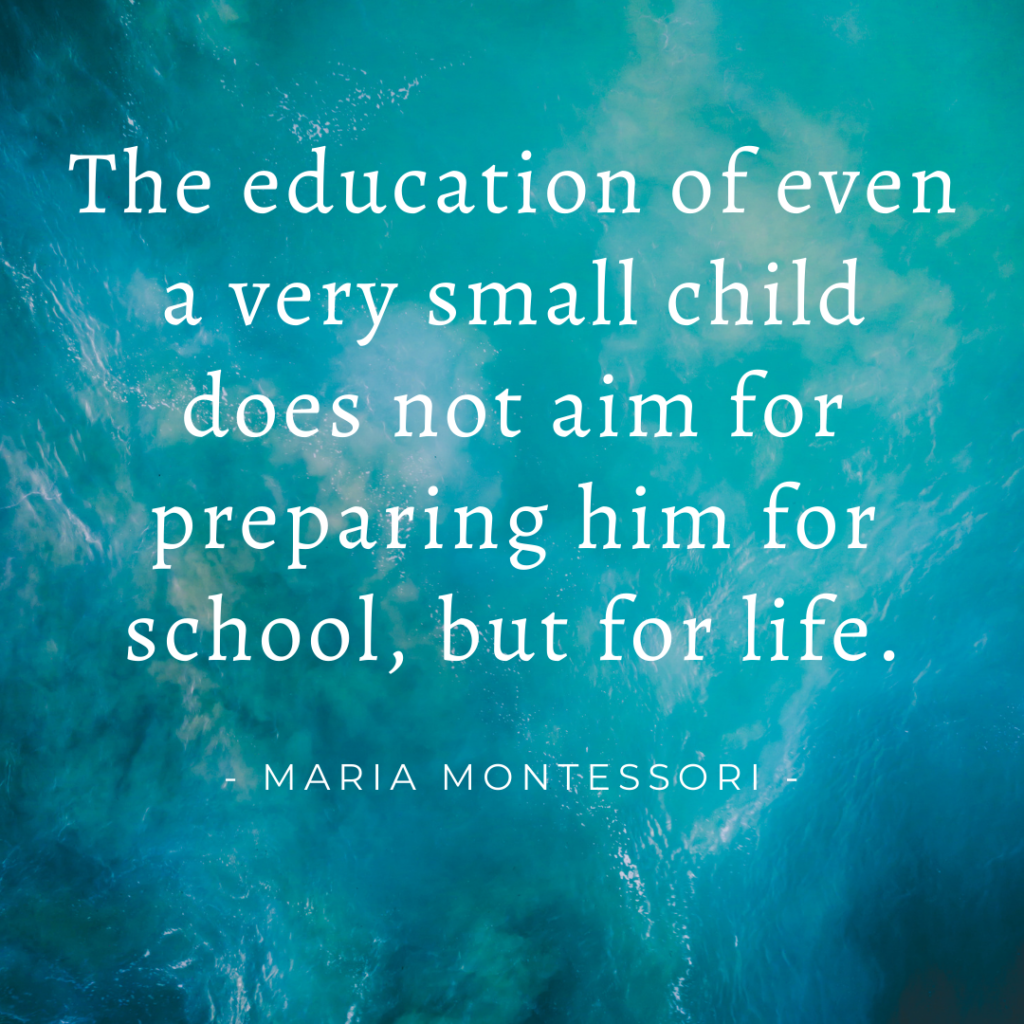
(This post contains affiliate links. Purchasing from these links costs you nothing extra, but helps with our website upkeep.)
Taking advantage of the sensitive period for coordination and movement, Practical life activities are enjoyable and beneficial for preschool-age children.

The benefits of Practical Life activities
- sense of order
- independence
- concentration
- coordination of movement and control over body
The 4 main groups of Practical Life
- Preliminary Activities
- Self Care
- Care of Environment
- Grace and Courtesy
There are many Practical Life activities that are universal; presented in every Montessori classroom.
However, Montessori teachers and parents take liberties with their Practical Life areas.
This is because the real-life lessons children need can vary from classroom to classroom and home to home. This flexibility is vital for following a child in their needs.
If you are implementing Montessori in your home, this could mean teaching your child how to fix a plate of nachos or setting up a Baby Bell cheese unwrapping activity.
Below is a list of Practical Life activities.
This is by no means exhaustive, but by the end of the list, you should have an understanding of the purpose and benefits of these activities, as well as when to introduce them.
You might also come up with some creative variations or some Practical Life ideas of your own.
This list is great for Montessori homeschooling or if you are looking to supplement your preschool classroom's traditional curriculum.
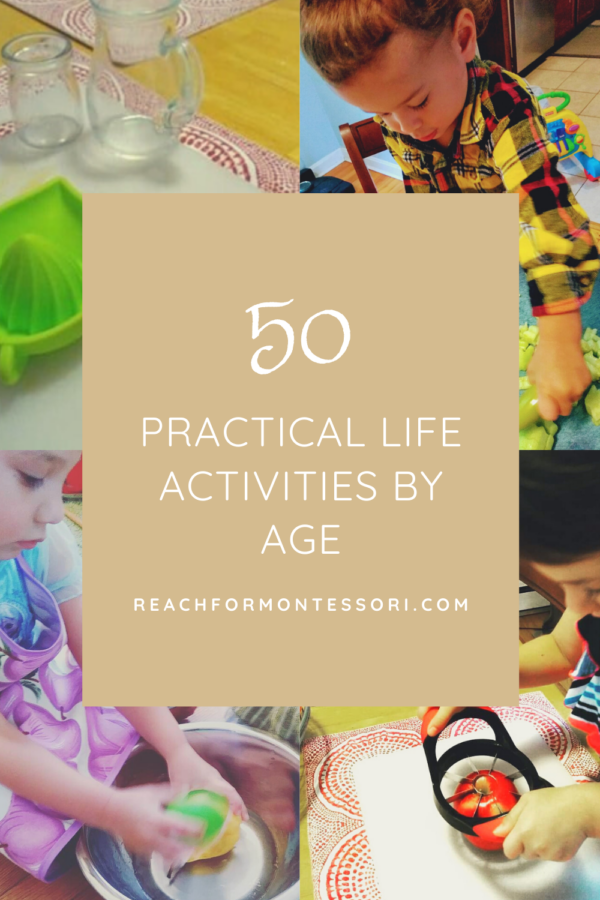
Practical Life Activities List
Preliminary Practical Life Activities
Preliminary Practical Life activities are the very first Practical Life activities a child is introduced to when they enter a Montessori classroom.
Work Mats
- 2.5-3 years old
- Work mats are used to delineate a child's work area. Work mat activities teach children how to unroll and roll work mats, as well as how to walk carefully around the workspace of others.
- Comprehensive Set: This kit includes a durable polishing tray, a…
- Usage: Wood polishing, mirror polishing, leather polishing etc….
- Skill Development: Encourages fine motor skills, hand control,…
Walking a Line
- 2.5-3 years old
- Also a lesson in Grace and Courtesy, walking a line helps children control their movement and increases a child's awareness of their body position in relation to others.
Moving a Chair
- 2.5-3 years old
- Children are taught to move furniture carefully and quietly.
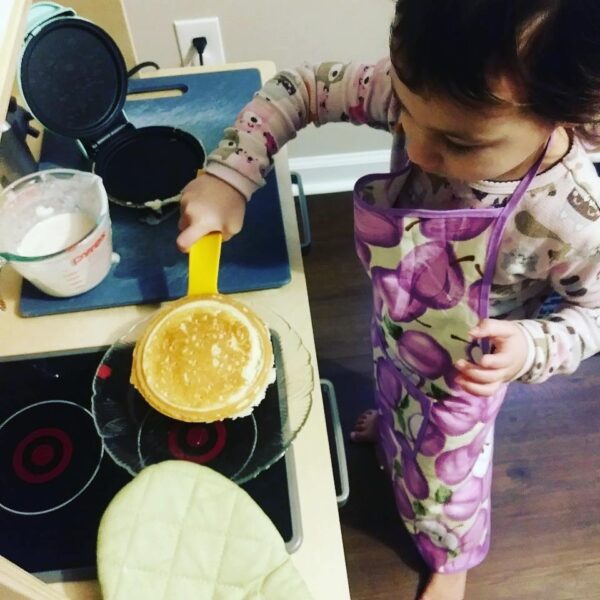
Wiping a Spill
- 2.5-3 years old
- Learning how to wipe a spill is essential to meal and snack times, as well as many Montessori activities.
Carrying a Tray
- 2.5-3 years old
- Carrying a tray is involved in many Montessori activities in the classroom.
Opening and Closing Containers
- 2.5-3 years old
- Through this activity, children gain a skill and get fine motor practice.
Whole-Hand Grasp Transferring
- 2.5-3 years old
- This is transferring activity that builds fine motor skills. This activity allows children who have not yet mastered the pincer grasp (for spoon, tongs, tweezers, ect.) to have success at transferring small items from bowl to bowl
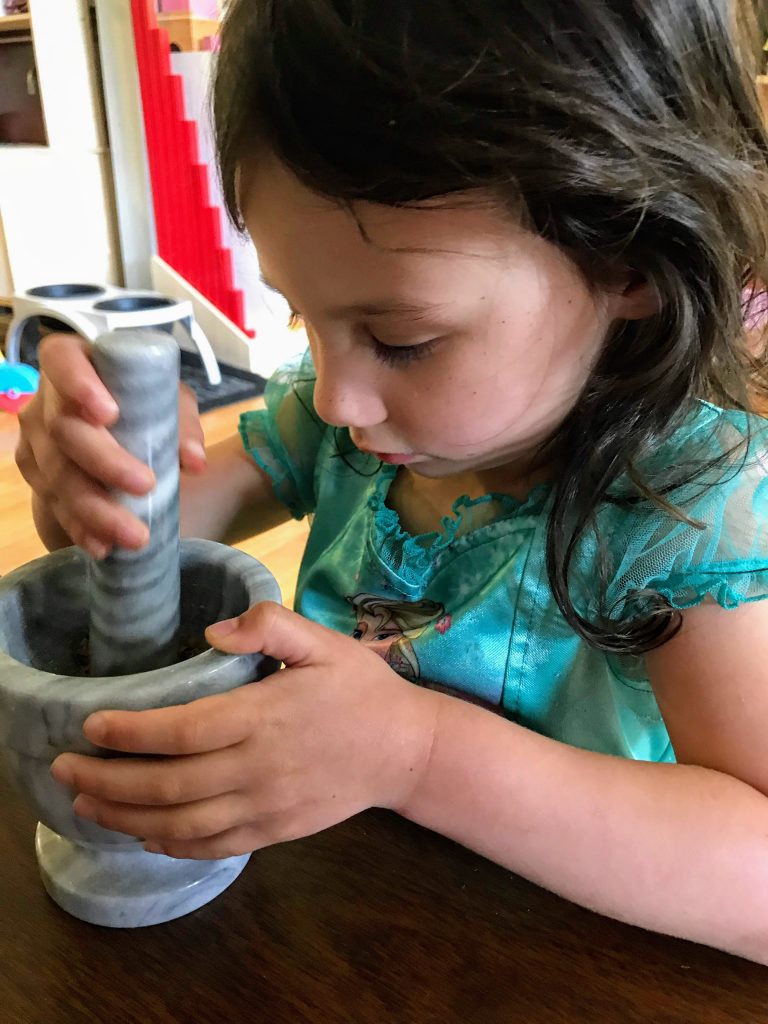
Spooning Activities
- 2.5-3 years old
- Montessori spooning activities are fun and help develop coordination, as well as fine motor skills.
Pouring Activities
- 3 years old
- Many Montessori activities require a child to have practice in pouring. Early pouring practice is a fun and essential activity.
Self Care
Children enjoy the sense of confidence and independence of being able to perform self-care tasks.
In Montessori, self-care activities are broken down into manageable steps, increasing a child's chances of success.
Hand Washing
- 2.5-3 years old
- Children learn a self-care skill and gain a sense of independence through this activity.
- Dimensions: Pail 6.18″*5.51″ (15.7cm*14cm), Bowl 7.56″*2.95″…
- High-Quality Materials: Durable porcelain and metal pieces paired…
- Child-Sized for Independence: Each item is perfectly sized for…
Cleaning Under Fingernails
- 2.5-3 years old
- Children learn a self-care skill and gain a sense of independence and fine motor skills through this activity.
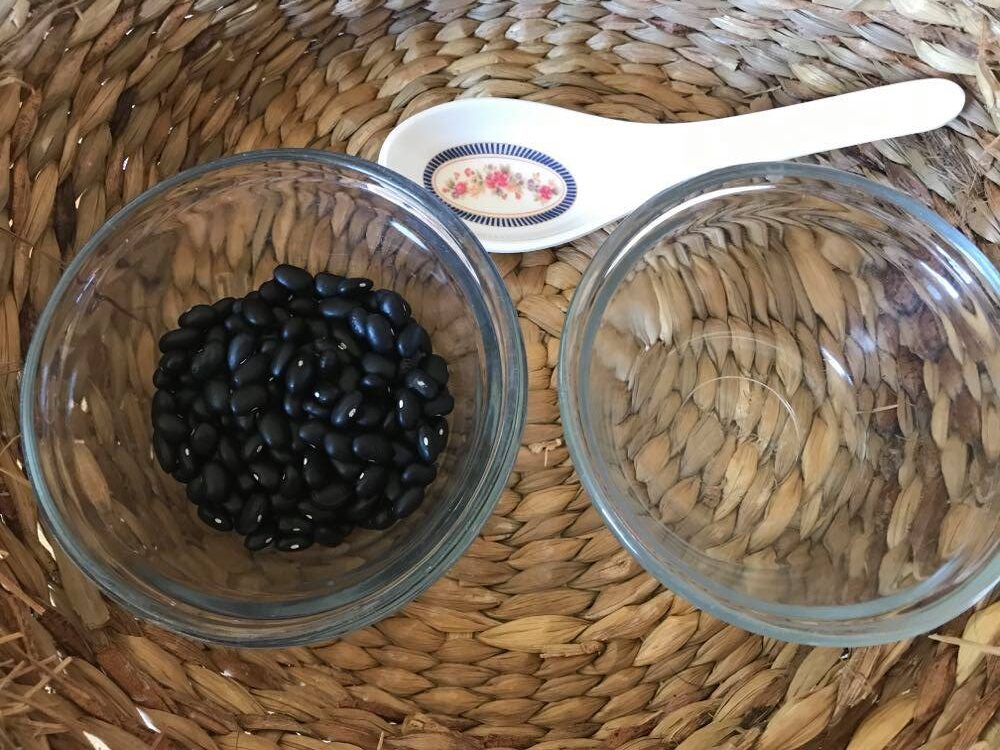
Dressing Frames
- 3 years old
- Usage: to teach your baby how to put on clothes
- Size: 10″ *10″*0.6″ for one piece
- Material: wood and clothing
Folding Clothes
- 3 years old
- Children learn a life skill, control of movement, and a sense of symmetry.
Putting on a Coat
- 2.5-3 years old
- Children enjoy the feeling of independence being able to put on their own coat gives them.
Matching Keys to Locks
- 3 years old
- This is a fine motor activity that increases concentration.
- Hands-on Learning: Children’s Potential for Learning Can be…
- Fine Motors Skills: Helping Children Develop Coordination, Visual…
- Practical Life Skills: Helping Kids Learn Use Keys to Lock and…
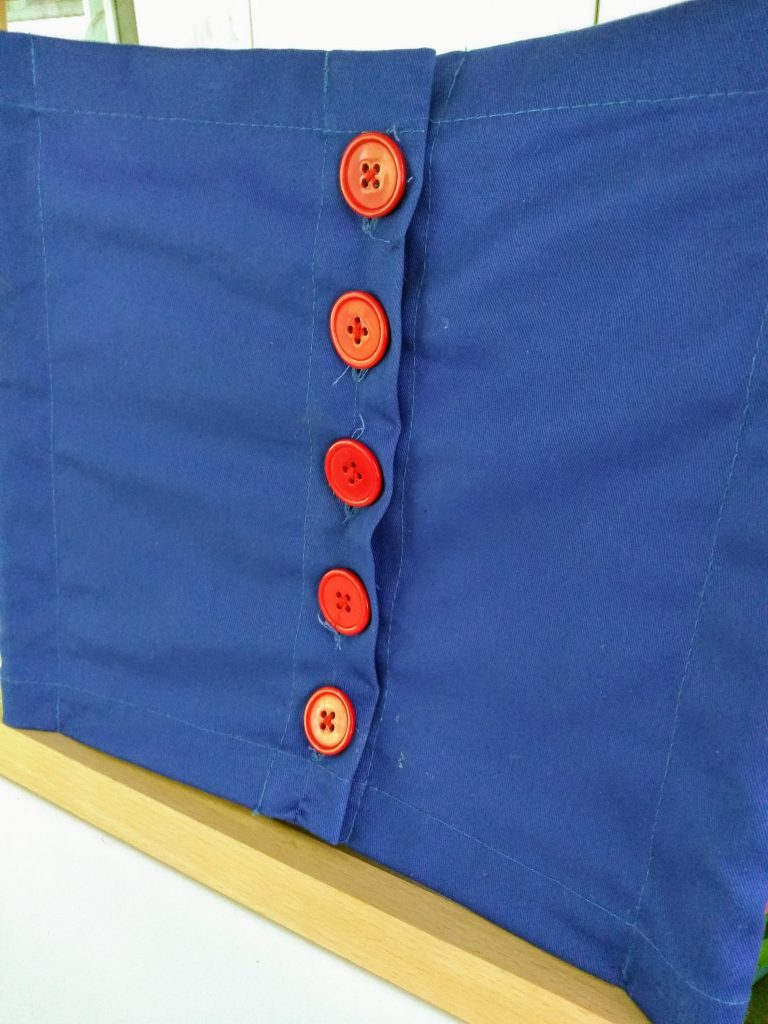
Care of Environment
Care of environment activities teach children to care for and respect their home environment, classroom, and the outdoors.
Cleaning a Spill
- 3 years old
- Learning how to clean a spill properly is integral to a safe and clean learning environment.
Brush and Dustpan
- 3 years old
- Learning how to use a brush and dustpan is necessary in a Montessori learning environment, as children are allowed to experience the natural and logical consequences of spills and breaks.
- COMPACT & ELEGANT DESIGN : The brush and the back panel of the…
- STURDY & WELL BUILT: A metal pan, with a natural beech wood back…
- EASY TO USE: Easily scoop and dump with the little dust pan and…
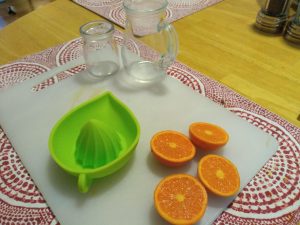
Washing a Table
- 3 years old
- This is a skill that will be used often in the Montessori classroom.
Washing Dishes
- 3 years old
- This is an enjoyable activity that gives children a sense of pride and ownership over their environment.
Using Clothespins
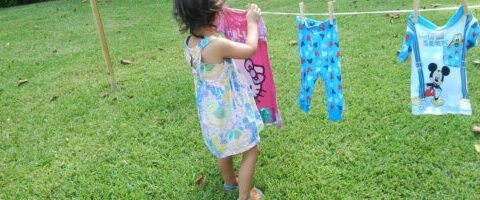
- 3 years old
- Clothespin activities are great for fine motor development.
- Never Go Wrong As a Gift – This montessori toys Perfect For…
- Safe for Children: Safety tested to ASTM F963 standards and CPSC…
- Instructions – The set includes four dowels and cotton rope that…
Polishing a Mirror
- 3 years old
- Polishing a mirror is a fine motor, concentration-building activity.
- Comprehensive Set: This kit includes a durable polishing tray, a…
- Usage: Wood polishing, mirror polishing, leather polishing etc….
- Skill Development: Encourages fine motor skills, hand control,…
Plant Care
- 3 years old
- Learning how to care for a plant is helps a child's development in many ways and encourages them to help keep their environment beautiful.
Flower Arranging
- 3-4 years old
- Arranging flowers is a relaxing activity that encourages enjoyment of nature, visual discrimination, and fine motor development.
Animal Care
- 4 years old
- Animal care activities help children develop empathy and have elements of gross motor and fine motor refinement.
Sorting Silverware
- 3 years old
- This is a life skill that also teaches a child about categories.
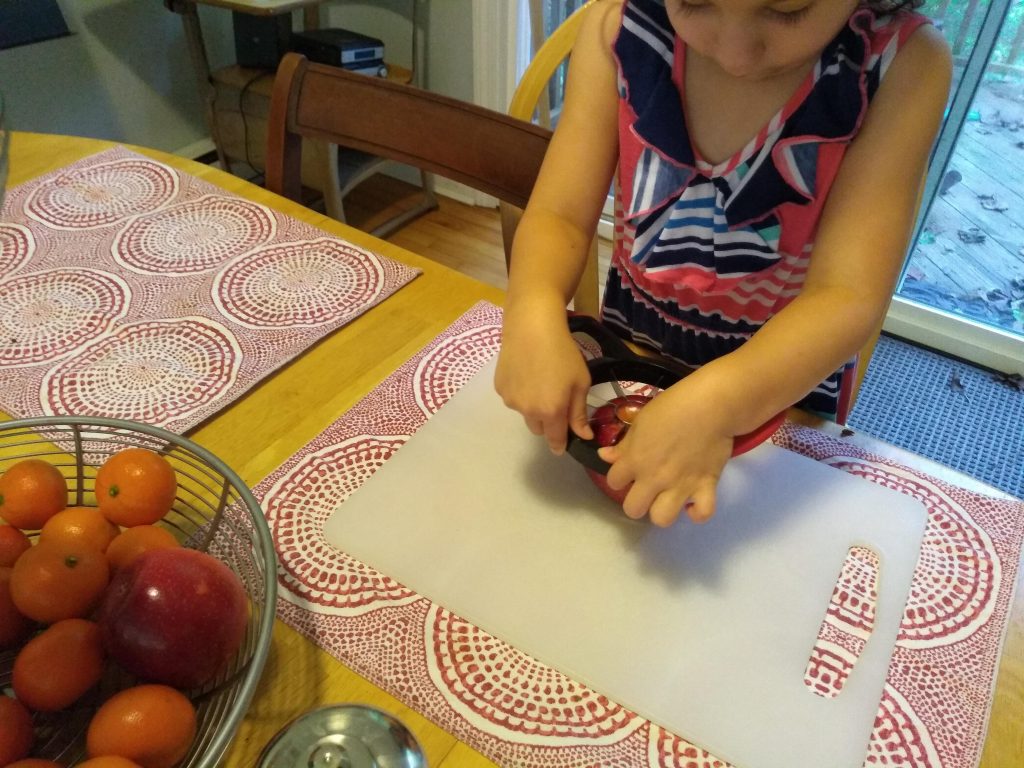
Setting a Table
- 3 years old
- Learning how to set a table is a Practical Life activity that teaches a child the skill of setting a table and encourages fine motor development, as well as visual discrimination.
Making Juice
- 4 years old
- This activity teaches children how to make juice using a hand juicer and it is a great fine motor skills activity.
- Snap on the small reamer for lemons and limes, or the large…
- Measurement markings up to 350 mL
- Drip-free pour spout
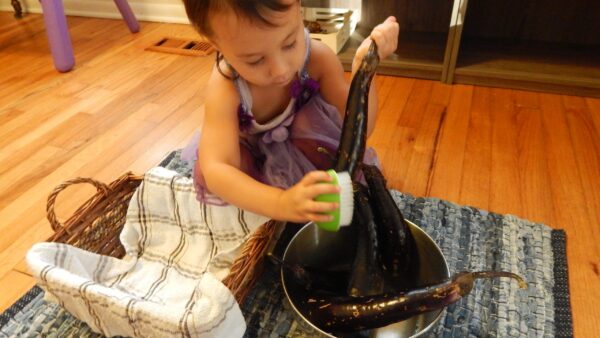
Grating Soap
- 4 years old
- This is a fine motor skills and visual discrimination-building activity.
- Great to have in your kitchen when preparing and to cook food.
- The Grater comes with a container to keep garlic and cheese one…
- It is ideal for garlic, cheese, and zesting citrus.
Washing Fruits and Vegetables
- 3 years old
- Washing fruit and vegetables is a great early food preparation activity that helps develop fine motor and concentration.
Peeling and Chopping Fruits and Vegetables
- 4 years old
- Fine motor skills, coordination of movement, and the ability to prepare food are all aims of this activity. Special care should be taken by the caregiver to closely monitor and give instruction on knife safety.
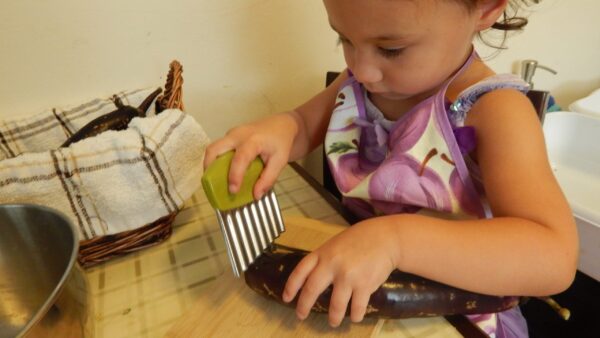
Using Rolling Pin
- 3-4 years old
- This activity gives a child the skill of using a rolling pin, plus fine motor and coordination skills.
- Higher Quality: HelferX Small Wooden Rolling Pin is made from…
- Perfect for Detailed Baking: Perfect for precise pastry work,…
- Kid-Friendly & Family Fun: An ideal size for children’s baking…
Using Manual Egg Beater
- 3.5 years old
- This activity teaches children how to use a rotary egg beater. This is a great fine motor/hand-eye coordination activity.
- Perfect for eggs, light batters, whipped cream and more
- Smoothly rotating gears are enclosed for protection and easy…
- Beaters are elevated and continue to work while resting on bottom…
Prepare Nesting Materials Box
- 3-4 years old
- Making a nesting materials box involves fine motor practice, cosmic lessons, and zoology.
Sifting Flour
- 3.5 years old
- An estimating and measuring activity that teaches a child how to use a sifter.
- DURABLE DESIGN: This flour sifter is made from sturdy stainless…
- PEFECT YOUR POWDERS: This flour sifter comes with a fine mesh…
- CLUMP FREE RESULTS: Breaks up any lumps in flour and aerates at…
Recycling Sorting
- 3 years old
- A sorting activity with a cosmic education/environmental focus.
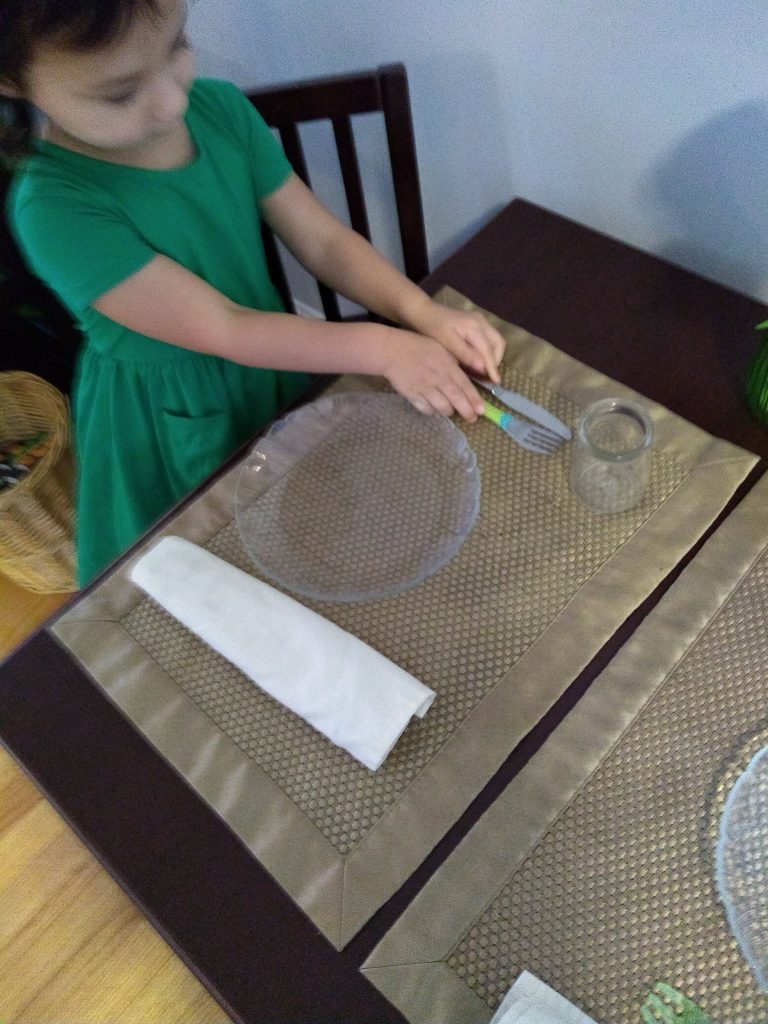
Composting
- 3 years old
- Teaching children about composting can have fine motor, sorting, science, and cosmic lesson components.
Nuts and Bolt Fastening
- 3 years old
- Fasting nuts and bolts is a fine motor and concentration-building activity.
- CLASSIC EDUCATIONAL BOARD – The Montessori Screw Driver Board is…
- MAKING LEARNING FUN – The Montessori Screw Driver Board is a…
- BEST MONTESSORI TOYS – The best Montessori toys are those that…
Spreading Toppings
- 3 years old
- This activity gives children practice with the skills they need to fix their own snacks.
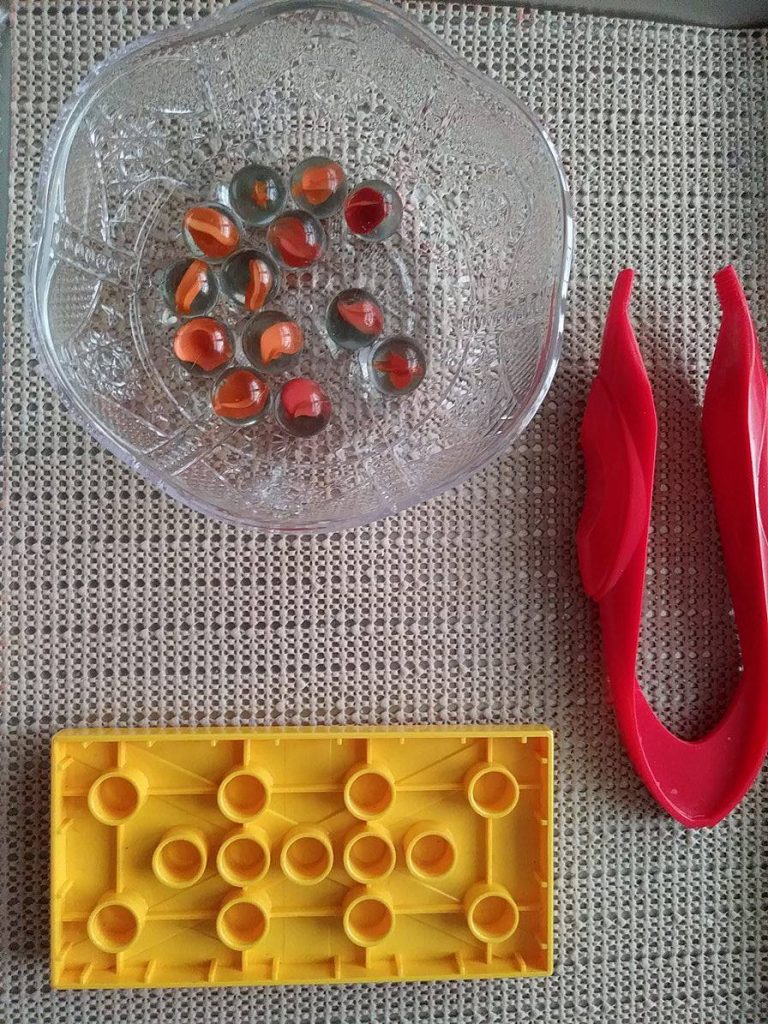
Hammering Nails
- 4 years old
- Learning how to hammer nails teaches safety with sharp and heavy objects and has gross and fine motor components.
- TRADITIONAL TOY. The tap tap art game is very popular classic toy…
- LEARNING TOY. The miniature hammer and nails will help your kids…
- SKILLS DEVELOPEMENT: fine motor toys game promotes children's…
Wrapping a Gift
- 4-5 years old
- This activity is great for helping children develop skills of estimation, fine motor skills, and cosmic lessons on gift-giving.
Weaving
- 4 years old
- Teaching children to weave helps develop fine motor skills, as well as listening skills. It can also satisfy schematic play needs.
- Braiding and weaving made it easy, perfect for small hands
- Age range: 3 years up
- This weaving board exercise the baby's hands-on ability, weave…
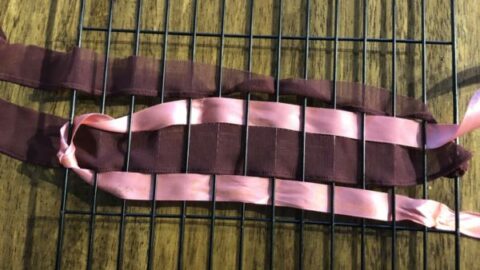
Sewing a Button
- 4 years old
- A fine motor activity that gives children the ability to fix torn cloth items.
- Long-term use and Rustproof: The embroidery needles are made of…
- 3 Different Sizes Meet You Need: 5pcs 1.05 x 46 mm/1.8 inch, 5pcs…
- Easy to Use: Due to the extra large eye,the stitching needles are…
Grace and Courtesy
Grace and courtesy activities help acclimate young children to social customs and manners. Grace and courtesy lessons may be different across cultures.
Greeting People
- 2.5-3 years old
- Learning how to greet people gives children a sense of independence and an increased awareness of others.
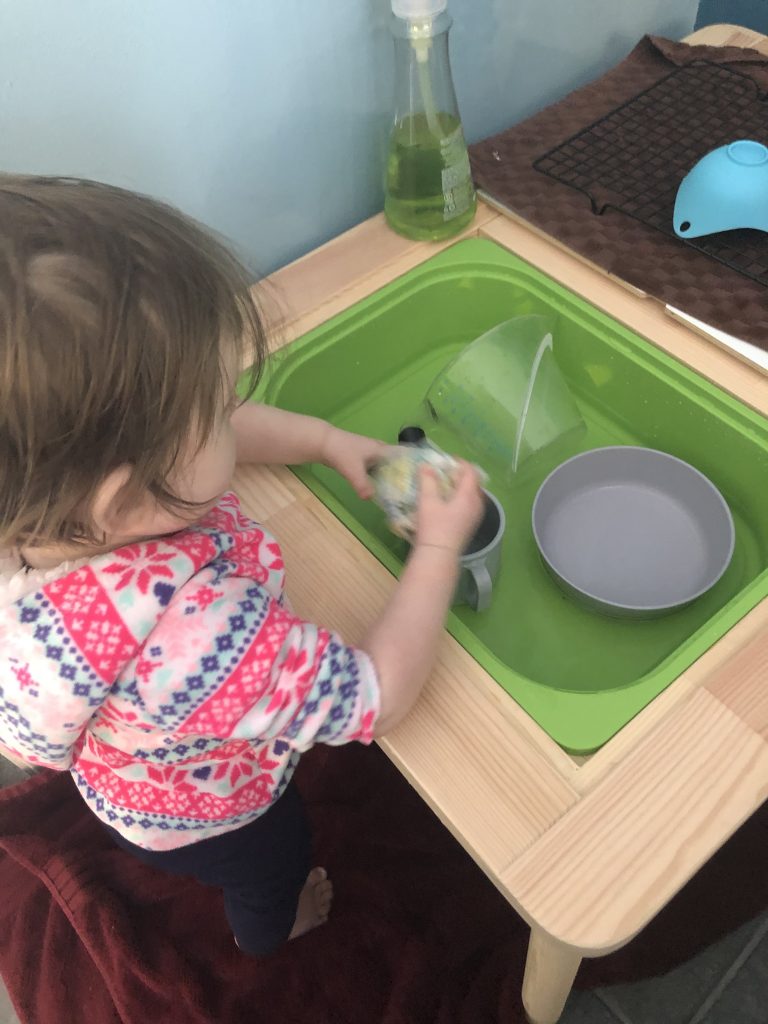
Getting Someone's Attention
- 2.5-3 years old
- Learning how to get someone's attention without interrupting is important in Montessori classrooms.
Phone Etiquette
- 4 years old
- Children learn how to answer the phone, end a conversation, and take a message.
Blowing Nose
- 2.5-3 years old
- This is a self-care and grace and courtesy lesson.
Coughing and Sneezing
- 2.5-3 years old
- Children learn how to turn their heads/use their elbows when coughing and sneezing.
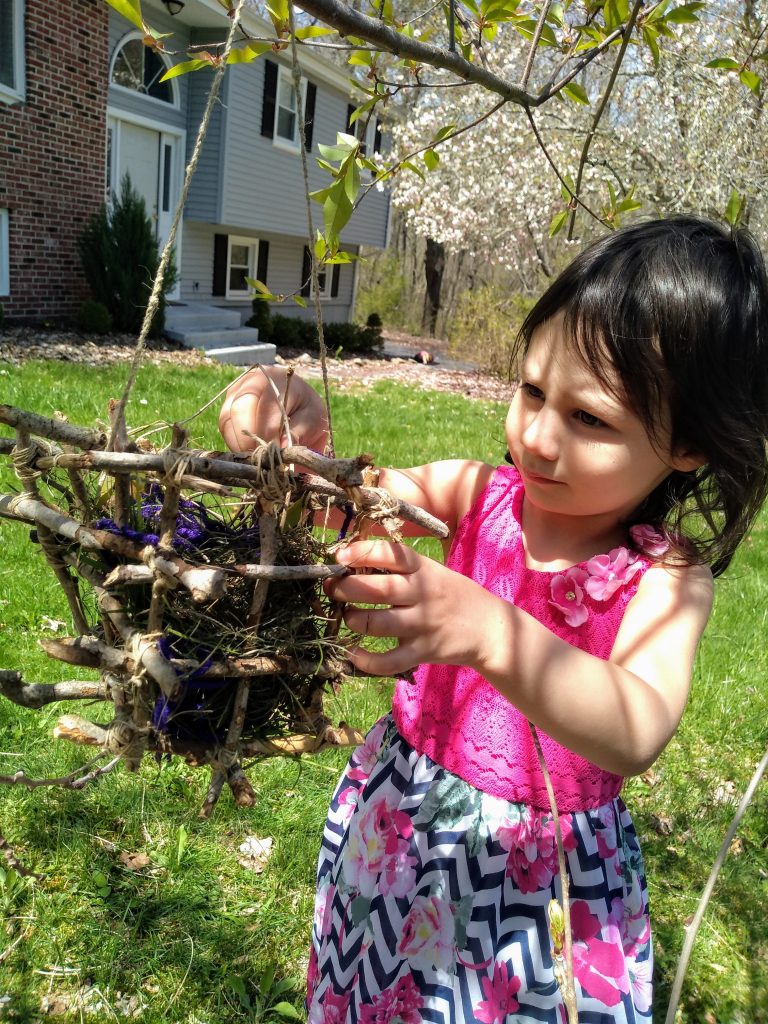
Offering Help to Others
- 4 years old
- Offering to help others is a lesson in empathy and increases a child's awareness of others.
Waiting to be served at the Table
- 3 years old
- This activity helps teach children to learn gratitude and patience.
Serving Food to Others
- 3 years old
- Serving others food is an empathy-building exercise and has elements of fine and gross motor and control of movement, as well.
Please, Thank You, and You're Welcome
- 2.5-3 years old
- Children learn how to use their manners by saying “Please”, “Thank you”, and “You're welcome” at the appropriate times.
As stated, this is by no means a comprehensive Practical Life Activities List. The limit truly is a caregiver's imagination.
What Practical Life activities does your child enjoy?
Cheers and don't forget to subscribe!
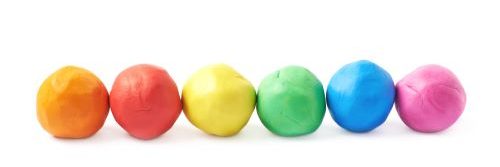
















SUPERB HANDS ON ACTIVITIES.
This is a wonderful site, and it has helped me a lot.
Loved all the activities .Absolutely convinced that the children will be totally involved.